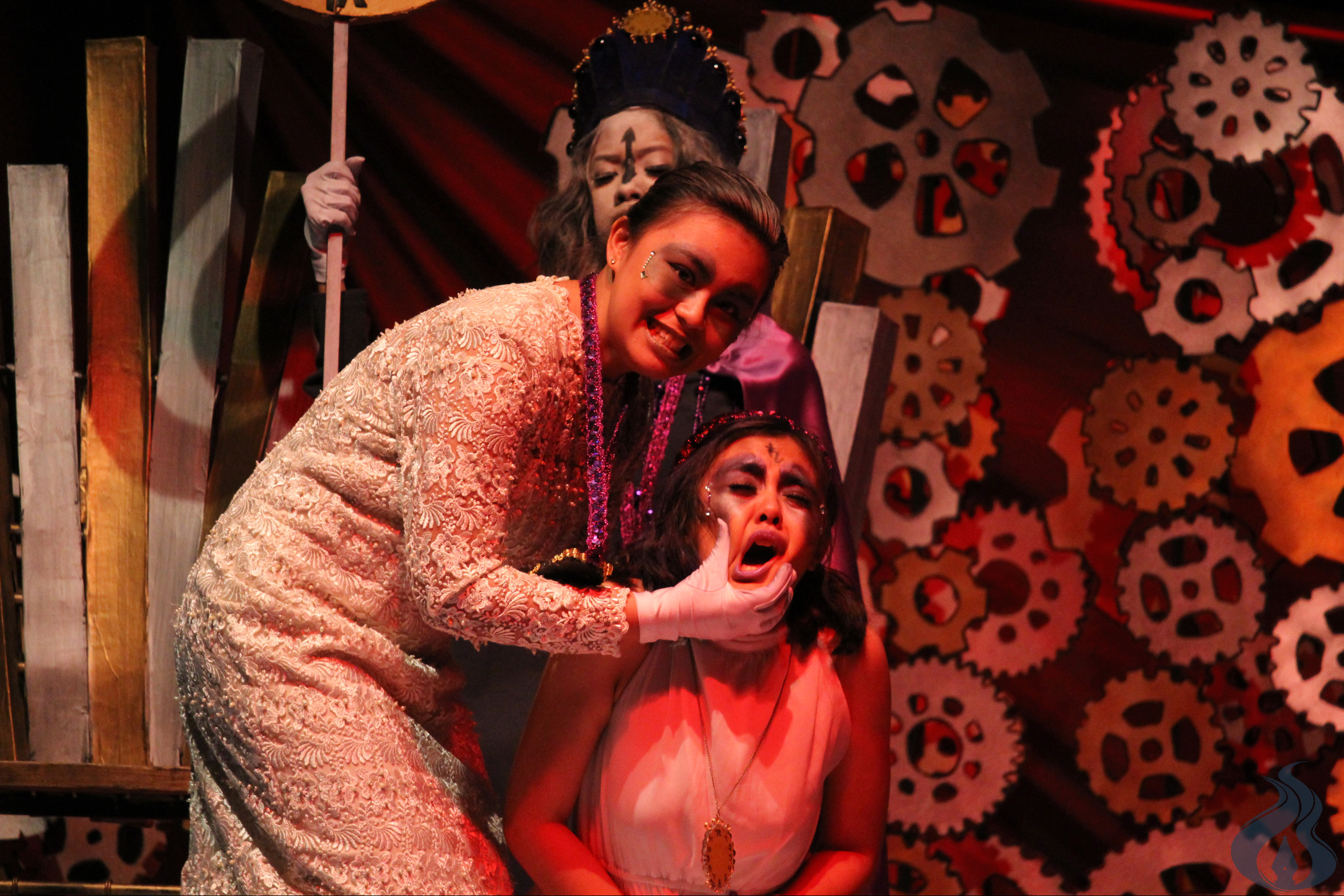
TIME IS the indefinite continued progression of existence and events that occur in apparently irreversible succession from the past through the present to the future. However, Pendulum seeks to let the audience think otherwise.
Fascinated by the concept of time, writer Rani Mae Aberin attempted to reconcile Cronus, the god of time in Greek mythology, with the modern era. She revealed a god who intervenes with the linear motion of time. He halts time and allows the past to catch up. As he trains a student to be his rightful heir, the next in line to help the mortals proceed to the future, he was in awe by the struggles of the youth faces today.
The play had three settings carefully arranged in one spacious stage with the mood set through stage lighting. Any change of color and the constant flicker of lights were done to drive the audience to feel the change in atmosphere.
The first scene features Cronus, thudding his golden time staff twice, commencing the tick of time. Startled by the noise, his student Hannah woke up from her slumber and began to sit straight as Cronus made her recall the laws of time. She failed to properly recite these laws as she deemed them dull and boring. Cronus, accustomed to Hannah’s irritable approach to anything tedious, therefore, decided to recite it for her.
The stage lighting shifted into yellow and white to display neutral ambiance. Another scene opened, next to Cronus and Hannah’s: a café where four friends seated at a roundtable reminiscing their past as orphans. They longed for their friend named Faye, subtly leaving a vacant seat in case she ever arrives. The three of them were adopted save for Abie, who grew up independently in a foster home and was currently working in the cafe. With this aside, the friends decided to play truth-or-dare with spin the bottle. This being Hannah’s final test: to manipulate them by controlling to whom the bottle points.
As the lights begin to dim, another character emerged from the background. A lady wearing a white-laced dress faced Hannah, stroked her hair and called Hannah her daughter. On the latter part of the play, it was revealed that Hannah was a victim of parental abuse. Her mother, Segunda, oppressed her by refusing her to be with her friends. Segunda constantly blamed Hannah as the reason why her husband left. With this, Hannah had suicidal tendencies. Later at her birthday, her mother promised her a gift under one condition: If her father ever comes back within the day she is set to be free, but if not, she will be a prisoner. Hannah grew delusional when her father didn’t arrive. She counted time and eventually, succumbed to death. She woke up to Cronus’ place of time, and he dubbed her as Hannah when, really, she was Faye.
The play’s set design was suited for the time setting of the play. A large clock was placed at the background, indicating that time consumes us and it is not just an illusion—it is something tangible and real.
The play, above all else, is about a girl trapped in between the seconds of time; a girl who is still grounded by the ghost of her past. Heavily driven by her emotions, Hannah—although unwilling to choose the fate of her four friends—was determined to be the heir of Cronus. Closing to an end, she faced Cronus and declared she was ready. Cronus proceeded to remove his necklace and crown, placed it upon Hannah’s head, and returned to his throne of chrome and gold to rest. She faced the audience and asked who among the four friends they are wishing to have a happy ending.
The play evolved to be a metafiction because the narrator intentionally appeared in the story as a divine entity telling the audience what he or she is going to do next. This technique of the writer was oddly effective. Giving the audience an opportunity to participate is rarely done; and with only one ending, it left the audience puzzled over the other characters’ ending.
Artistang Artlets presented Pendulum as a three-day production from April 26 to 28 at the Albertus Magnus Auditorium in line with their 35th year of “Passion Abbreviated.” F ANDREA JAMAICA H. JACINTO




[…] Andrea Jamaica (5 May 2016). “Artistang Artlets’ Pendulum: A Review”. The Flame. The Flame. Retrieved 30 March […]
[…] Andrea Jamaica (5 May 2016). “Artistang Artlets’ Pendulum: A Review”. The Flame. The Flame. Retrieved 30 March […]